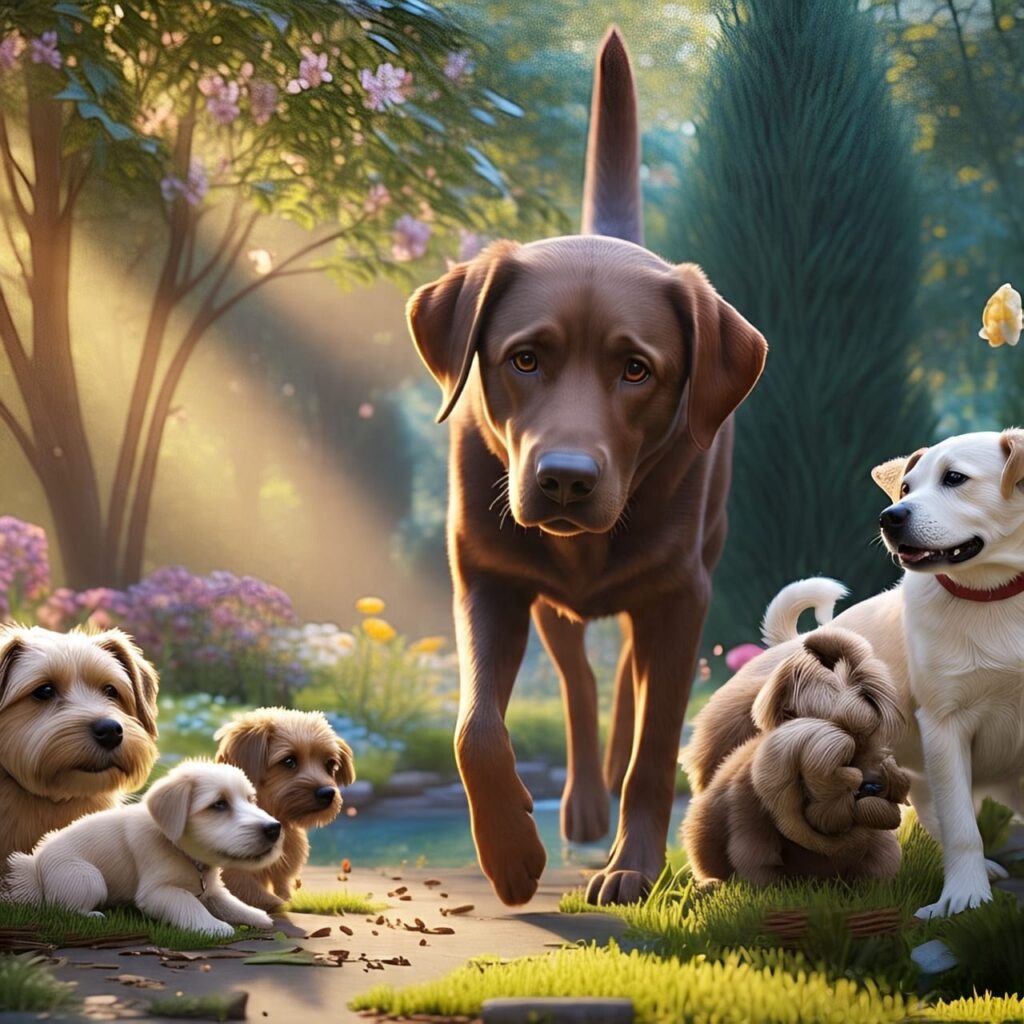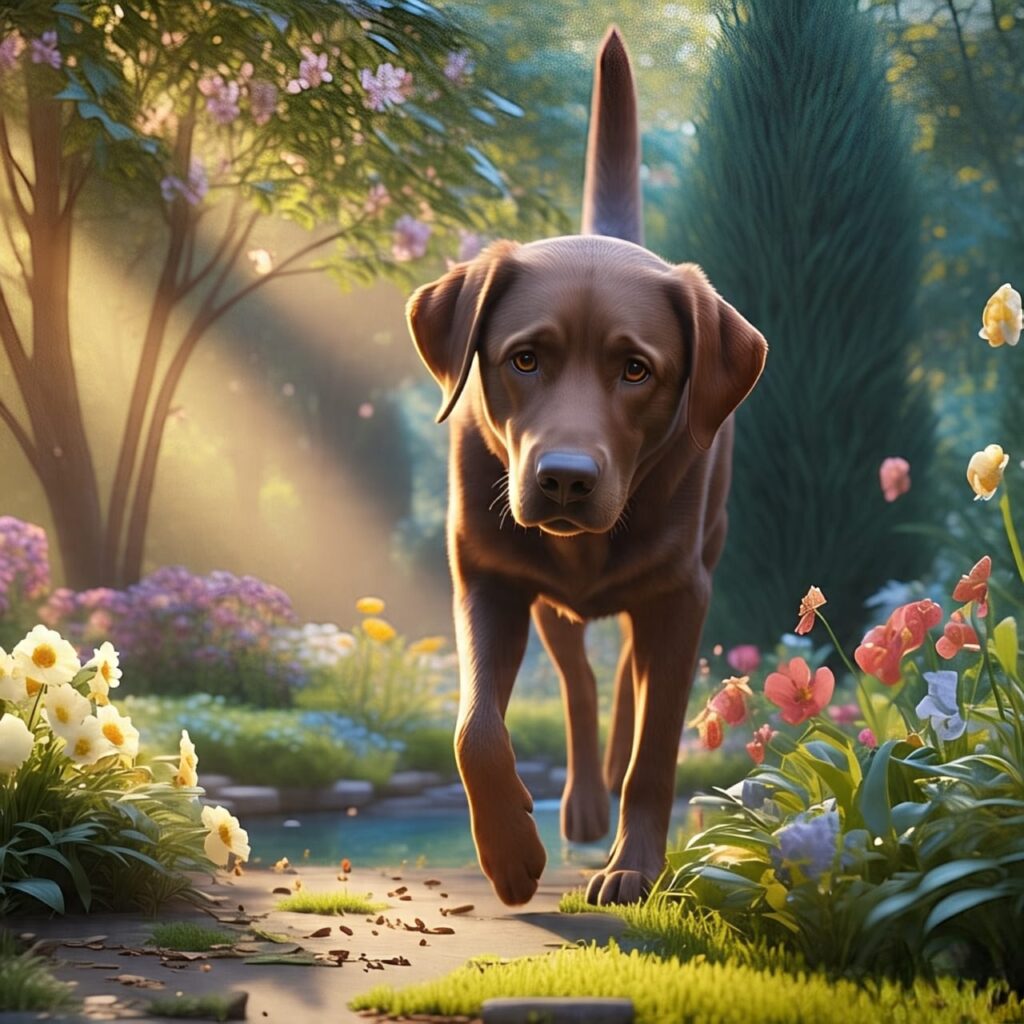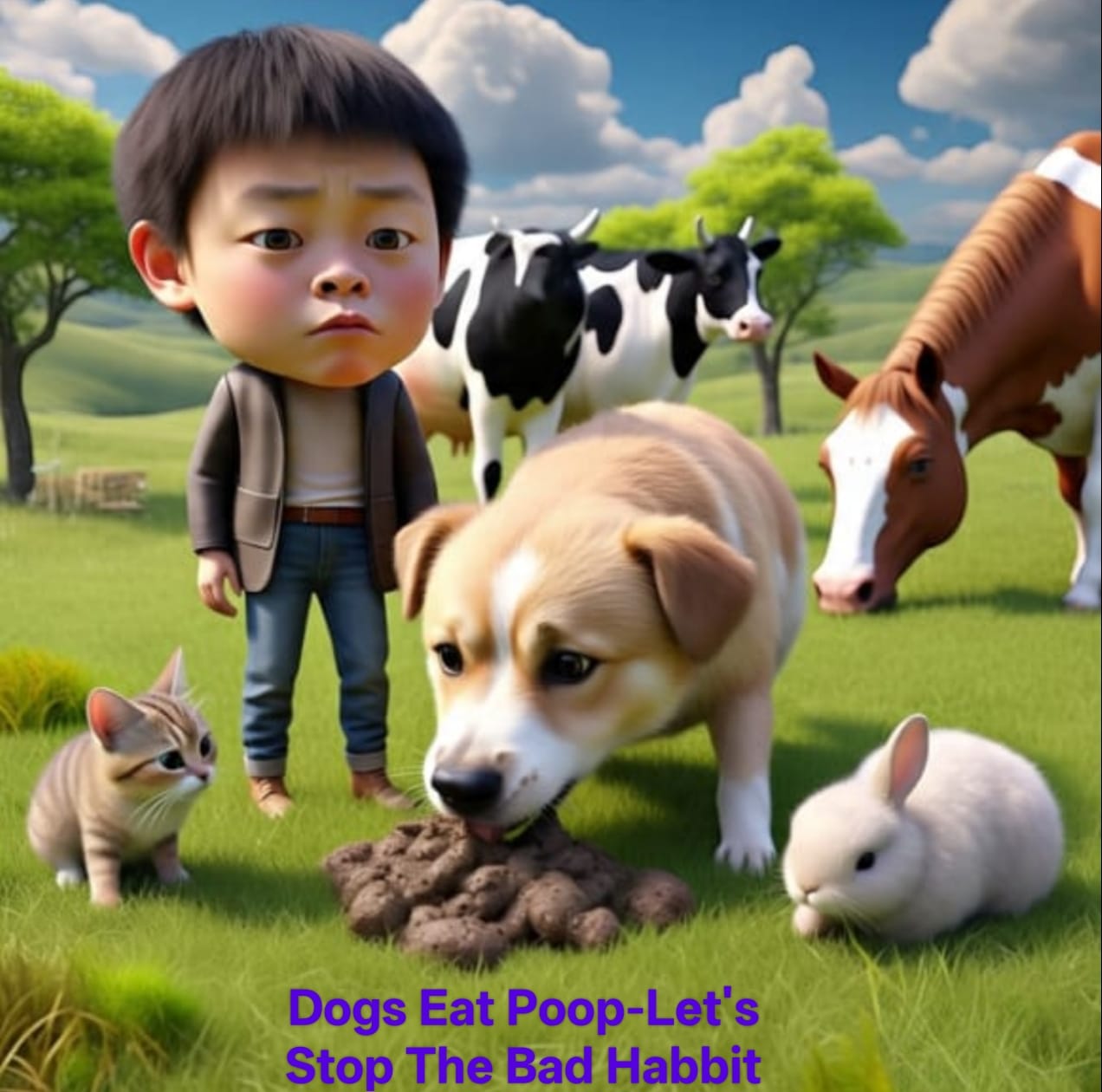Dogs eat poop is a major health issue—and you’re completely grossed out, right? Don’t worry, you’re not the only one. This odd and disgusting habit has a name: coprophagia. And although it may appear to be simply another strange dog quirk, there may be more to it than you see. From instinctual behaviors to medical conditions, there’s a whole of everything behind this pungent enigma. Let’s explore nose-first (not literally, please!) into why your dog could be eating something they absolutely shouldn’t.

Table of Contents
Lets know Coprophagia
Coprophagia?
Eating one’s own/others feces scientifically referred to as Coprophagia. It may sound absurd, yet it’s a phenomenon found in not only dogs but also numerous other animal species. Dogs eat poop due to various reasons .We will discuss all one by one.
Is This Behavior Common?
As per a Journal of Applied Behaviour Science study, roughly 16% of dogs are “frequent” coprophagists and as many as 24% have been found to have eaten feces one or more occasions
Why Some Dogs Are More Prone
Some breeds and dogs that are bred in such a small environment are prone to such behaviour, For example, working breed dogs that engage in scavenging in the wild may carry such habits even when they are domesticated pets.
Main reasons of Coprophagia
Due to Nutritional Deficiencies
Here we discuss some common nutritional deficiencies that can cause coprophagia (poop-eating behavior) in dogs, along with their effects on the dog’s health and behavior. Dogs eat poop mostly due to below listed deficiencies.
| Nutritional Deficiency | Description | Effects on Dog | Connection to Poop-Eating |
|---|---|---|---|
| Digestive Enzymes | Enzymes such as protease, amylase, and lipase assist food breakdown. | Poor digestion, undigested food in stool, hunger after eating. | Dogs eat poop with undigested food to obtain missing nutrients. |
| Vitamin B1 (Thiamine) | Helps in brain and nerve function. | Neurologic problems, weakness, loss of appetite. | Might cause abnormal appetites or pica, such as coprophagia. |
| Vitamin B12 (Cobalamin) | Necessary for energy metabolism and red blood cell formation. | Weakness, weight loss, lethargy, GI upset | Dogs eat poop to get absent nutrients. |
| Folic Acid (Vitamin B9) | Helps in proper cell function and metabolism. | Retarded growth, anemia, GI upsets. | May results to increased hunger and unusual cravings. |
| Iron | Most important for RBC production and oxygen transport. | Results in Anemia, weakness, fatigue. | can develop tendency in dogs to eat self/others feces in search of iron-rich supplements. |
| Zinc | Play Important role for skin, immune function, and enzyme activity. | Poor coat, skin infections, digestive upsets. | Deficiency can cause behavioral changes, which may develop coprophagia and pica. |
| Fiber | Aids in digestion and bowel regularity. | Constipation or diarrhea, irregular appetite. | Dogs eat poop to add missing fiber to their diet. |
| Protein | Necessary for muscle, skin, immune health. | Muscle loss, poor coat, weakness, hunger. | Dogs may try to “recycle” protein by eating their own feces. |
| Fatty Acids (Omega-3 & 6) | Maintain skin health, brain function, and anti-inflammatory processes. | Dry skin, poor coat, poor cognition. | Pet searches for alternative sources of fat in stool. |
| Magnesium | Helps in Supporting muscle and nerve function. | Muscle weakness, Tremors, poor appetite. | Develops cravings and odd eating behavior in pets. |
| Calcium | Important for bones, nerves, and muscles. | Weakness of bones, muscle tremors, irregular heartbeat. | This can lead to compulsive behaviors, including poop-eating. |
| Phosphorus | With calcium it works better for bone and energy metabolism. | Bone abnormalities, fatigue, weakness. | In this pets may eat self/others feces to restore mineral balance. |
| Sodium & Chloride (Salt) | Helps in regulating fluid balance and nerve function. | Dehydration, confusion, lethargy. | Dog develop cravings to stool-eating if stool has salt traces. |
| Potassium | Important for nerve impulses and muscle contractions. | Body weakness, arrhythmias, muscle cramps. | Dog develop unusual cravings including coprophagia. |
Instinctual Behaviors That Lead to Coprophagia in Dogs
| Instinctual Behavior | Description | Reason Behind Poop-Eating |
| Motherly Hygiene Behavior | In order to make the nesting area clean, mother dogs will lick and eat the feces of their puppies. | Reduces odor to prevent predators and keeps the whelping area clean. |
| Puppy Mimicry | Puppies learn by doing what the mother or littermates do. | Puppies can imitate the mother’s feces-eating behavior. |
| Den Cleaning Instinct | Dogs have an instinct to keep their living quarters clean. | Eating poop serves to keep the “den” tidy, particularly in small areas. |
| Survival Instinct | In nature, there is not much to eat and dogs will consume anything available. | Feces will have undigested nutrients that the dog will attempt to retrieve. |
| Pack Submission Behavior | Pack submissive dogs do not get punished by picking up after themselves. | Consuming feces is thought to be a sign of submission and conflict avoidance. |
| Scavenging Instinct | Dogs are instinctual scavengers with keen noses and appetites. | They investigate and consume pungent materials, including feces, from curiosity or hunger |
| Oral Exploration in Puppies | Puppies learn about the world using their mouths. | Poop is just another thing to discover, particularly if it smells like something they eat. |
| Boredom or Isolation Response | Isolated or confined dogs may create repetitive or compulsive behaviors. | Coprophagy alleviates stress or offers stimulation in a lackluster situation. |
| Attention-Seeking Behavior | Dogs need attention and learn what elicits a reaction. | If eating poop elicits an exaggerated human reaction, dogs will do it again to get attention. |
| Learned Behavior | Doing it over and over without correcting it can turn it into a habit. | If not discouraged at first, it becomes a reinforced, natural behavior. |
Behavioral Factors
Behavioral Factor | Description | How It Affects Poop-Eating Behavior |
| Boredom | Insufficient mental and physical stimulation. | Sometimes, dogs eat poop for entertainment or to end the monotony. |
| Anxiety or Stress | Due to changes, separation, punishment, or being introduced to new environments. | Stress can cause compulsive behaviors such as coprophagia as a way of coping. |
| Negative Reinforcement | Yelling and punishment that produces fear-based reactions. | Dogs might attempt to get rid of evidence of accidents by consuming it to prevent future punishment. |
| Attention-Seeking | Dogs need human interaction and feedback. | They might repeat the act if they discover that eating feces elicits a response. |
| Punishment After Accidents | Severe rebuke for household accidents. | Dogs eat poop to “hide the evidence” and escape punishment. |
| Learned Behavior | Dogs learn to imitate other dogs, particularly in multi-dog families. | One dog that eats poop may teach the others to eat poop. |
| Compulsive Disorder | Repetitive, obsessive behaviors typically exhibited by stressed or kept dogs. | Coprophagia can become an acquired habit with time. |
| Lack of Training or Boundaries | Lack of fundamental commands or behavioral adjustment. | Dogs might not learn that this behavior is unacceptable without proper training. |
| Early Weaning or Neglect | tEarly separation of puppies from mothers or exposure to poor environments. | Possibly lacking natural learning signals and developing abnormal behaviors such as coprophagy. |
| Food Obsession | Individuals with intense concentration on food or eating. | They might consider feces as a food source because of high food drive. |
| Confinement or Crate Training Issues | Dogs isolated or crated for long periods. | Limited space and stimulation can lead to boredom-induced poop-eating. |
| Unclean Living Spaces | Feces left on the environment for too long | Promotes the behavior because feces becomes more convenient and familiar. |
| Inadequate Supervision Outdoors | Dogs left alone when walking or in the yard. | Dogs eat poop undetected, repeating the behavior without being corrected. |
Environmental Triggers That Affect Poop-Eating in Dogs
| Environmental Trigger | Description | Impact on Poop-Eating Behavior |
| Dirty or Poop-Surrounded Living Space | Unclean environment with accumulated waste | Dogs eat poop purely because they are exposed to it often or as a cleaning behavior. |
| Overcrowding | Excessive number of dogs in a small space. | Causes stress and competition, resulting in inappropriate behaviors such as coprophagia. |
| Insufficient Outdoor Time | Occasional walks or outside time to use the bathroom. | Dogs will defecate inside and then consume it to escape punishment or maintain cleanliness. |
| Unsanitary Crate or Kennel | Feces not removed on a regular basis from contained spaces. | Triggers the natural instinct of the dog to “clean up” its surroundings. |
| Sudden Routine Changes | New home, owner, schedule, or surroundings. | Disruption can lead to anxiety-based behaviors, such as eating stool. |
| Exposure to Other Dogs’ Feces | Access to feces of other animals in multi-pet households or public places. | Sometimes, Dogs eat poop through curiosity or habit after repeated exposure. |
| Lack of Mental Stimulation | Tedious, uninteresting surroundings (indoors or outdoors). | Triggers attention- or entertainment-seeking behavior based on boredom, such as coprophagia. |
| Irregular Feeding Environment | Unpredictable feeding areas or disorganized meals | Triggers food-related anxiety, potentially causing dogs to find other “food sources. |
| Neglected Backyard or Yard | Feces not regularly removed from lawn or dog run. | Fosters ready availability and temptation, particularly if feces carry food-like odors. |
| Extreme Weather Conditions | evere weather can cause dogs to poop in the house or in the crate. | Leads to self-cleaning habits, particularly if dogs are kept under restriction for too long. |
| Unfamiliar Environments | Traveling, changing residences, or staying in kennels. | Dogs can get anxious or confused about where to go potty and will eat poop |
Health Risks of Poop-Eating
| Health Risk | Description | Prevention |
|---|---|---|
| Bacterial Infections | diarrhea and vomiting | deworming and hygiene maintenance at regular intervals |
| Parasitic Infestations | Parasites similar to Giardia and hookworms | Needs routine vet check-ups |
| Digestive Issues | Unbalanced gut flora from contaminated stool | Provide a well balanced diet with probiotics |
How to Stop Your Dog from Eating Poop
Practical Solutions-
| Method | Description | Expected Outcome |
|---|---|---|
| Quick Feces Disposal | Pick up feces promptly from yard or living area. | Removes access to feces and prevents the habit from continuing. |
| Reward-Based Training | Reward your dog when they ignore feces or eliminate properly. | Encourages good behavior and discourages poop-eating. |
| Boost Physical and Mental Stimulation | Add more walks, playtime, or puzzle toys. | Reduces boredom and stress-related behaviors like coprophagia. |
| Provide a well balanced, High-Quality Diet | Ensure your dog is getting all essential nutrients. | Helps prevent poop-eating due to nutritional deficiencies. |
| Add Stool Deterrents to Diet | Use products like For-Bid, pineapple, or pumpkin in meals. | Makes stool taste unpleasant, discouraging the dog from eating it. |
| Train the “Leave It” Command | Teach your dog to walk away from objects on command. | Gives you control when your dog approaches feces. |
| Supervise Outdoor Time | Monitor your dog closely during walks or playtime in the yard. | Allows immediate redirection if the dog approaches feces. |
| Address Underlying Anxiety | Use calming techniques, toys, or consult a vet for anxiety-related issues. | Reduces stress-driven behaviors like poop-eating. |
| Provide Regular Feeding Schedule | Feed your dog at consistent times daily. | Reduces hunger-driven coprophagia and builds routine. |
| Keep Living Space Clean | Regularly clean crates, bedding, and play areas. | Removes fecal matter and reduces self-cleaning instinct. |
| Limit Access to Cat Litter Boxes | Use covered boxes or place them in dog-inaccessible areas. | Prevents dogs from eating cat feces, which is common in multi-pet homes. |
| Use Bitter Sprays on Feces | Apply non-toxic deterrents like bitter apple spray to stool. | Discourages consumption by creating an unpleasant taste. |
| Consult a Veterinarian | Rule out parasites, deficiencies, or digestive disorders. | Addresses any medical reasons behind the behavior. |
| Avoid Harsh Punishment | Do not scold your dog after poop accidents. | Prevents fear-driven behavior like eating poop to “hide evidence.” |
| Use Muzzle (if necessary) | A basket muzzle during walks can prevent feces ingestion. | Temporary physical barrier while retraining the behavior. |
FAQs-
General Questions
- Why do dogs eat poop?
In the case of poop eating, dogs may be motivated by boredom, habit, hunger, curiosity, or a variety of other reasons. - Is it normal for dogs to eat poop?
t’s not rare, particularly among puppies, but it’s not good. - Why does my dog eat its own poop?
Some dogs do it because they are stressed, hungry or just used to it. - Why does my dog eat other dogs’ poop?
They might find the scent intriguing or consider it to be a source of food. - Why does my dog eat cat poop?
Cat poop is very high in protein and smells delicious to a dog.
Health & Behavior Concerns
- Is it bad for dogs to eat poop actually?
Yes. It may lead to health problems such as parasites or an upset stomach. - Can a dog become ill from eating poop?
Yes. They can pick up worms, bacteria or viruses. - What does it mean when a dog eats poop?
It could be boredom, bad food, stress or a health condition. - Is poop eating a sign of a nutritional deficiency?
Sometimes, yes — especially if the dog is missing some vitamins or enzymes. - Can parasites cause dogs to eat poop?
Yes, some parasites can make dogs hungrier (desirable, no?) which may lead to poop eating.
Prevention & Training
- How do I stop my dog from eating poop?
It’s a good idea to clean up in a nice and concise way, use some magical commands and your training should be consistent. - What home remedies stop dogs from eating poop?
It may help to include pineapple, pumpkin and spinach in the food. - Is there a supplement to stop dogs from eating poop?
Some supplements do make poop taste bad to dogs, yes. - Do pineapple or pumpkin stop dogs from eating poop?
Sometimes. They might alter the taste of the poop and break the habit.” - Does training help with poop eating behavior?
Yes, teaching commands like “leave it” gradually works, too.
Puppy-Specific
- Why do puppies eat poop?
They investigate with their mouths and frequently learn by imitating mom. - Will my puppy grow out of eating poop?
Most of the time, yes — most puppies do outgrow it. - How to stop a puppy from eating poop?
Monitor carefully, clean up quickly, and reward the good behavior.
Vet & Medical Advice
- Should I take my dog to the vet for eating poop?
Sure, especially if it’s new or happens often. - Is poop eating a sign of an underlying health problem?
Yes, rule out issues like parasites, poor diet, or diabetes.
Conclusion
Dealing with a poop-eating dog can be challenging, but understanding the underlying causes is the first step toward resolving the issue. Whether it’s a matter of diet, behavior, or health, addressing coprophagia with a comprehensive approach ensures your dog stays happy and healthy.Beside this if you want to learn more about food toxicity in pets, you can visit our blog article related to food toxicity.

